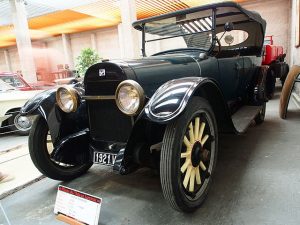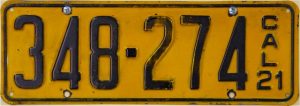Automobile Registrations are something most of us do now without thinking twice, though probably with a little grumbling as to the cost. The start of the 20th century ushered in a new mode of transportation, the horseless carriage, or motor wagon. When first introduced into the countryside of California, they were not readily embraced by all counties. Several counties passes ordinances requiring the horseless carriage to “pull to the side of the road and remain standing when horse drawn vehicles approached.” 1
California State statutes of 1901 authorized cities and counties to license bicycles, tricycles, automobile carriages, carts, and similar wheeled vehicles.
The secretary of state was empowered in 1905 to register and license motor vehicles. This took the task from the counties and provided a uniform statewide registration system. Owners paid a $2 fee and were issued a circular tag. Later, tags were either octagonal or had scalloped edges. Owners had to conspicuously display tags in the vehicle. In addition, they had to display the license number on the rear of the vehicle in 3-inch-high black letters on a white background. Some owners also painted numbers on headlamp lenses. Vehicle registration prerequisites included satisfactory lamps, good brakes, and either a bell or a horn.
The secretary of state handled vehicle registrations from 1905 until 1913 when the legislature gave the task to the state treasurer. At the same time, the Engineering Department became custodian of vehicle records.

This engineering department published the 1921 California Automobile Registrations in a collection of 14 volumes that were actually bound together as 7 books, two volumes per book. At the end of volume 14 are the “corrections and transfers” and there were a couple hundred pages worth, so it’s important for you to check/search those as well after finding the reference to your ancestor.
The books are not in alphabetical order, but rather numerical order of the Registration Number. This means to find people within the manuscript you will have to conduct a search of the records. You’ll find the search in the top right of the screen once you’ve opened each volume. There is no method of searching all volumes at once. These are extremely large volumes, over 1100 pages each and the search may be slow at time, but it appears to be quite accurate. I suggest a search by last name only if possible (Smith or Jones would be unreasonable, so use first names with more common surnames) as William appears as William, Wm and W in the records. It depends on how your ancestor submitted it.
The first vehicle to be registered under state law was a White Steamer owned by John D. Spreckels of San Francisco. His, however, was not the first automobile in California. The San Francisco Sunday Call, of May 11, 1902, recorded there were 117 motor vehicles in use in the city on that date. Six years earlier, the same paper reported that Charles L. Fir had owned the city’s only horseless carriage. By 1905, registered vehicles in California totaled 17,015.
The 1921 California Automobile Registrations shows that by 1921 there were 585,940 registrations which would represent the total number of legal vehicles in the state. What an amazing jump in registrations in that few of years!
The information in these registrations provides the registration number, name of registration holder, address, make, type, year and engine number, as well as the county number in which the registration holder resided. You can reference the list below to correspond the number with the correct county.

The first registration, #1 was assigned to the State of California and probably represented the Governors official vehicle, a 1917 Packard Tour with engine #130951.
The last registration, #585,940 was assigned to James Rianda of the community of Gonzales, Monterey County. He owned a 1921 Buick Tour with engine #774054.
- 1921 California Automobile Registrations Vol. 1-2
- 1921 California Automobile Registrations Vol. 3-4
- 1921 California Automobile Registrations Vol. 5-6
- 1921 California Automobile Registrations Vol. 7-8
- 1921 California Automobile Registrations Vol. 9-10
- 1921 California Automobile Registrations Vol. 11-12
- 1921 California Automobile Registrations Vol. 13-14, errata and transfers
California County Reference List
- Alameda County
- Alpine County
- Amador County
- Butte County
- Calaveras County
- Colusa County
- Contra Costa County
- Del Norte County
- El Dorado County
- Fresno County
- Glenn County
- Humboldt County
- Imperial County
- Inyo County
- Kern County
- Kings County
- Lake County
- Lassen County
- Los Angeles County
- Madera County
- Marin County
- Mariposa County
- Mendocino County
- Merced County
- Modoc County
- Mono County
- Monterey County
- Napa County
- Nevada County
- Orange County
- Placer County
- Plumas County
- Riverside County
- Sacramento County
- San Benito County
- San Bernadino County
- San Diego County
- San Francisco County
- San Joaquin County
- San Luis Obispo County
- San Mateo County
- Santa Barbara County
- Santa Clara County
- Santa Cruz County
- Shasta County
- Sierra County
- Siskiyou County
- Solano County
- Sonoma County
- Stanislaus County
- Sutter County
- Tehama County
- Trinity County
- Tulare County
- Tuolumne County
- Ventura County
- Yolo County
- Yuba County
Citations:
- California State Government. CA Department of Motor Vehicles History of CA DMV. Last Accessed: 9 May 2014.[
]
